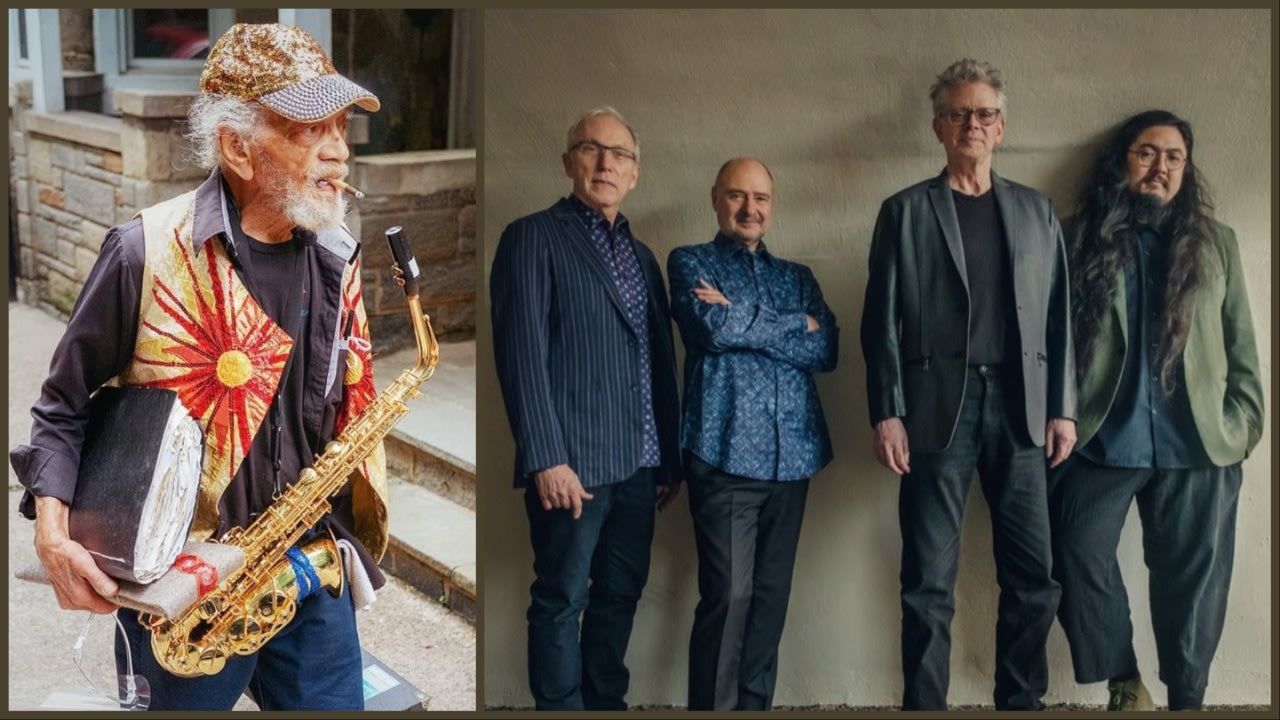 Left: Marshall Allen, photo by Harald Krichel. Right: Kronos Quartet, photo by Lenny Gonzalez.
Left: Marshall Allen, photo by Harald Krichel. Right: Kronos Quartet, photo by Lenny Gonzalez.
Sun Ra passed on to a higher plane a week after his 79th earthly birthday. His Arkestra, however, has been constantly active for the ensuing 31 years, continuing to perform his cosmic catalog under the stewardship of his earliest disciples. Saxophonist Marshall Allen, who has led the fluctuating collective since 1995, celebrated his 100th trip around the sun on May 25th of this year, just three days after what would’ve been the 110th anniversary of his mentor’s 1914 crash landing in Birmingham, Alabama.
Today, a month after this momentous occasion, the AIDS nonprofit Red Hot — formed in 1989 with the express mission of using pop culture as a tool to “promot[e] public health and diversity through equal access to care” — has released its fourth album in just over a year in a series of Sun Ra tribute compilations. On Outer Spaceways Incorporated (alternately titled Kronos Quartet & Friends Meet Sun Ra), Red Hot passes Ra’s original scores for the Arkestra to another group that’s been on the front lines of the avant garde for more than half a century.
For the new record, Kronos Quartet divided the privilege and responsibility of remolding Ra’s raw materials amongst a wildly diverse group of singers, rappers, producers, composers, and instrumentalists: Esteemed jazz singer Georgia Anne Muldrow opens the album with a relatively faithful rendition of its title track, accompanied by Jacob Garchik’s eccentric arrangement of the quartet’s strings. Laraaji applies his signature ambient brush strokes to the doo-wop deep cut “Daddy’s Gonna Tell You No Lie.” And Jlin and RP Boo, iconoclastic electronic artists with roots in the footwork tradition, use sampling and complex drum patterns to twist Kronos’ strings into strange new shapes on “Maji” and “Blood Running High,” respectfully, with adventurous New York rap duo Armand Hammer adding jarring lyrics to the latter — 700 Bliss (the joint project of DJ Haram and Moor Mother) take a similarly incisive approach to “Secrets of the Sun.”
On the more esoteric side, sound artists Nicole Lizée and Evicshen assemble their respective cuts, “The Furthest Out Things” and “Three Seasons in the Tempestuous Twelve Inch Planet,” at an atomic level; Terry Riley, a towering figure in experimental music for more than 60 years, and his frequent co-improviser Sara Miyamoto bring the whole thing home with its 10-minute closer, “Kiss Yo Ass Goodbye”; and Marshall Allen himself appears on three tracks with the legendary Laurie Anderson, the first of which also features Steven Bernstein’s tongue-in-cheek progressive jazz cover band, Sexmob.
At every stage, the strange string vibrations of Kronos Quartet permeate the album, standing in for Sun Ra’s piano as the project’s guiding hand. For all its surprising moments, Outer Spaceways Incorporated coheres as a single body of work, an undulating opus Ra himself would be proud of.
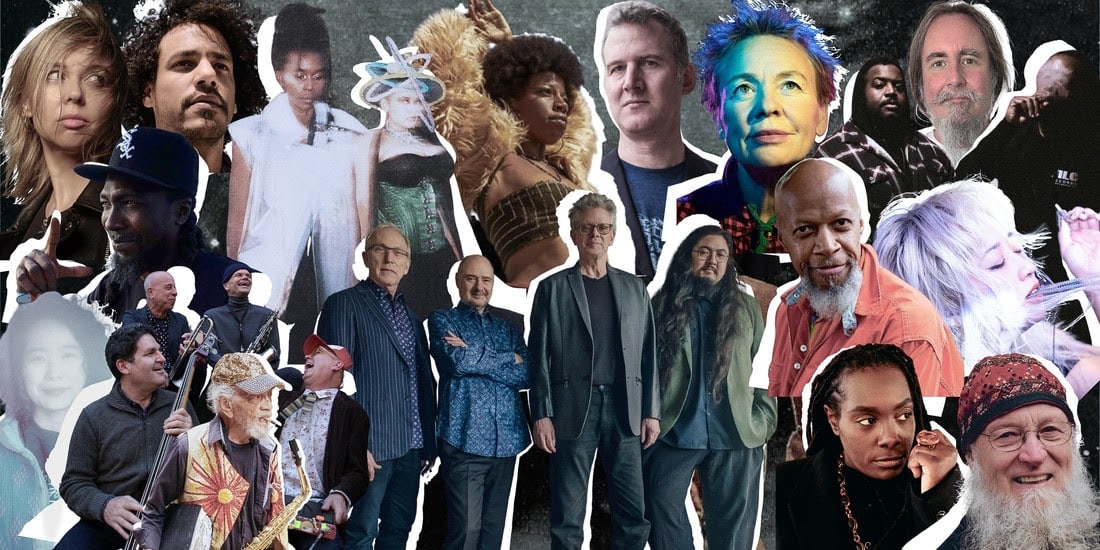 Montage of Kronos Quartet & Friends Meet Sun Ra, provided by Red Hot Org.
Montage of Kronos Quartet & Friends Meet Sun Ra, provided by Red Hot Org.
When did the music of Sun Ra come into your life, and how has it changed your own approach to music?
David Harrington of Kronos Quartet: I first heard Sun Ra’s music at Seattle’s Standard Records and Hi-Fi in 1967, when I should have been in geometry class. As time went on, I became aware of the huge creative force he exerts in American music. My friend Hal Willner mentioned Sun Ra to me every time we met, and I know for certain if Hal had lived, he would have been very involved in Kronos Quartet & Friends Meet Sun Ra. It seems to me that the work of Sun Ra demands a lifetime of exploration. The more I know of Sun Ra’s work, the more I want to take the future music of Kronos to the stratosphere.
Steven Bernstein: I first became aware of Sun Ra in high school. I grew up in the Bay Area, and Sun Ra and the Arkestra had been living there in the early ’70s, teaching at Laney College and UC Berkeley, living at the Black Panther house, and putting on various local concerts and events. Sun Ra was a strong part of the Bay Area mythology growing up. The records available to us at the time only showed us a small part of the story: The first time I heard him was his triumphant return to Berkeley in 1979, playing at UC’s Zellerbach Theatre. When I got to New York in 1979, I would hear him regularly at the Squat Theatre, as well as clubs like Danceteria. I was at two legendary outdoor shows: a beach concert near the purple barge in the summer of 1981 and the 1987 Central Park show. I wouldn’t say Sun Ra changed my approach to music; I’d say he helped form my approach to music.
LARAAJI: I had my first live experience of Sun Ra Arkestra in Park Slope, Brooklyn in the mid ’80s. The Arkestra was resplendent in its wardrobe, and the music was way outside the box. Listening to Sun Ra’s music did a Roto-Rooter job on my western sense of music and gave me the sense of freedom to move beyond my tonal boundaries.
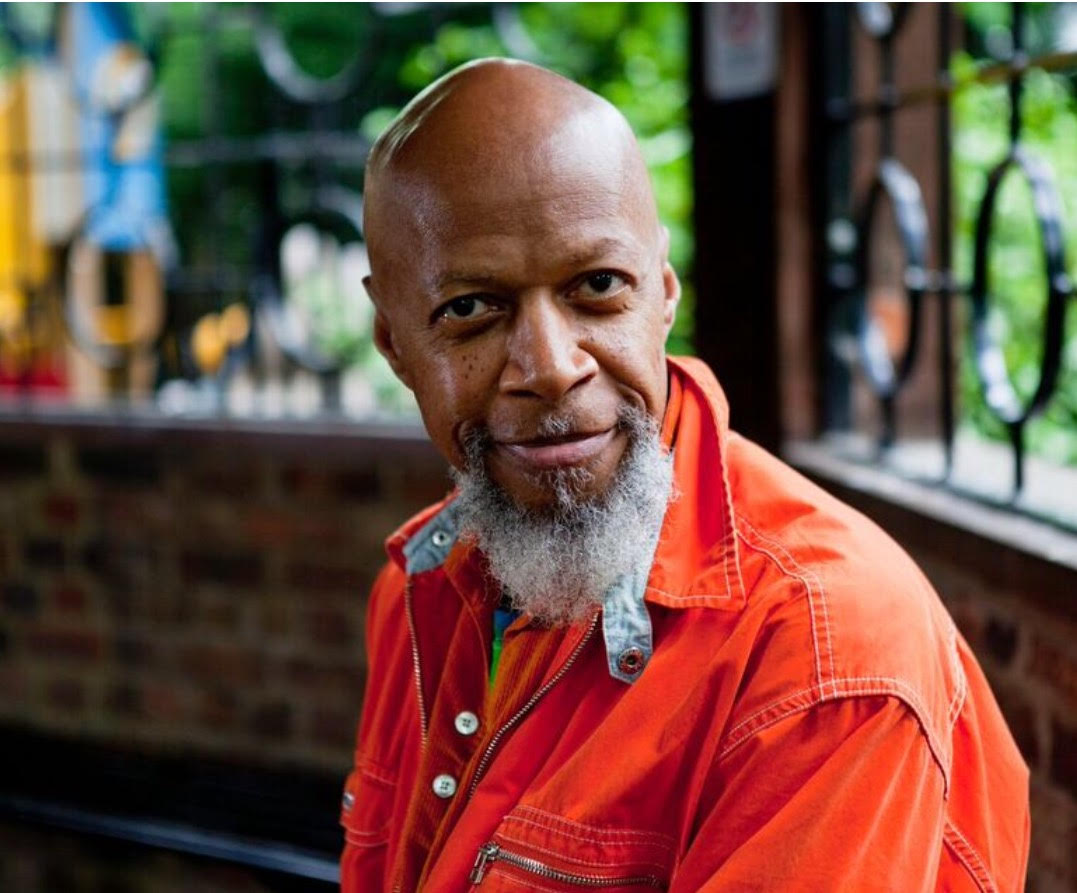 Laraaji. Photo via Liam Ricketts.
Laraaji. Photo via Liam Ricketts.
RP Boo: I really can’t say exactly when Sun Ra music came into my life. Being a kid born in the ’70s and taking in tunes while at home, or even at other family and friends’ houses, there was plenty of jazz music being played, and I truly enjoyed everything my ears were hearing. I wouldn’t be so shocked [if I’d] heard his music and just never asked who the artist was.
Nicole Lizée: The first time was likely in my late teens/early 20s (in the early ’90s), during university as a music student, when I suddenly had access to an extensive music library — one of the best parts of being at a music school. I essentially lived in this library and devoured everything: records, books, scores, magazines. I was always a voracious and eclectic listener from a young age, but here, I was suddenly exposed to music and albums I had only read about. This was a time when there were a lot of music magazines and zines, and artists and bands that you were into would talk about artists and albums that influenced them. I had read about Sun Ra and suddenly had access to his albums. I was heavily into music that defied genre — it was generally all called fusion at that time. Sun Ra’s albums were liberating, completely unpredictable, fearless, boundaryless, pure music: exactly as it should be. I’m not sure that Sun Ra changed my approach to music, but he did reaffirm the notion that music should be all these things.
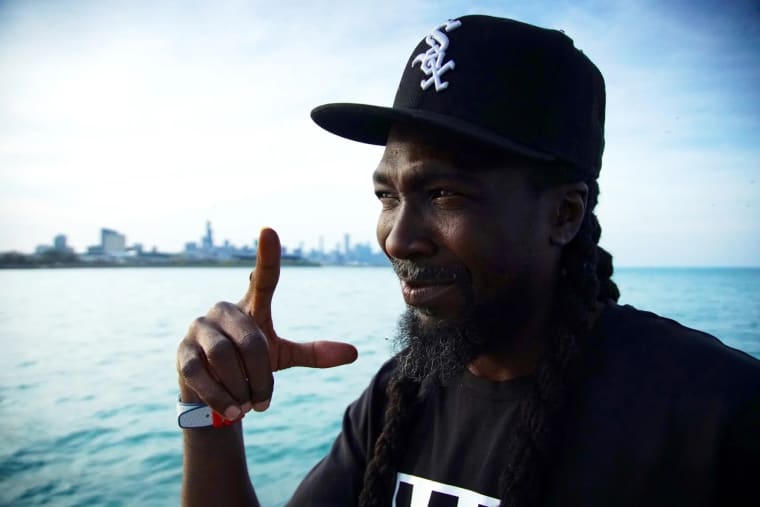 RP Boo. Photo by Wills Glasspiegal.
RP Boo. Photo by Wills Glasspiegal.
 Armand Hammer. Photo by Arman Naji.
Armand Hammer. Photo by Arman Naji.
Jlin: I was introduced to Sun Ra’s music a bit later in my life, probably around my mid 20s. It has such an abstract, eclectic sound that has been executed brilliantly for decades. Honestly, the biggest thing for me is that, in all that genius in the body of their work, they stand for something: spirituality.
ELUCID: I was introduced by my grandfather, who was into Lee Morgan and John Coltrane. I remember Sun Ra was the weirdest sounding thing! I just didn’t really understand. I can’t remember the name of the album, but at that point, being a teenager, I had never heard anything like that, so I was drawn to it because of its otherness, its strangeness, and not being able to understand it. Sun Ra’s music gave the idea of possibility, and the ability to reinvent and transform yourself, your mindset — to present yourself a path toward newness.
billy woods: I became aware of Sun Ra’s catalog because of his effect on so many producers and people around me. I always thought it was interesting music.
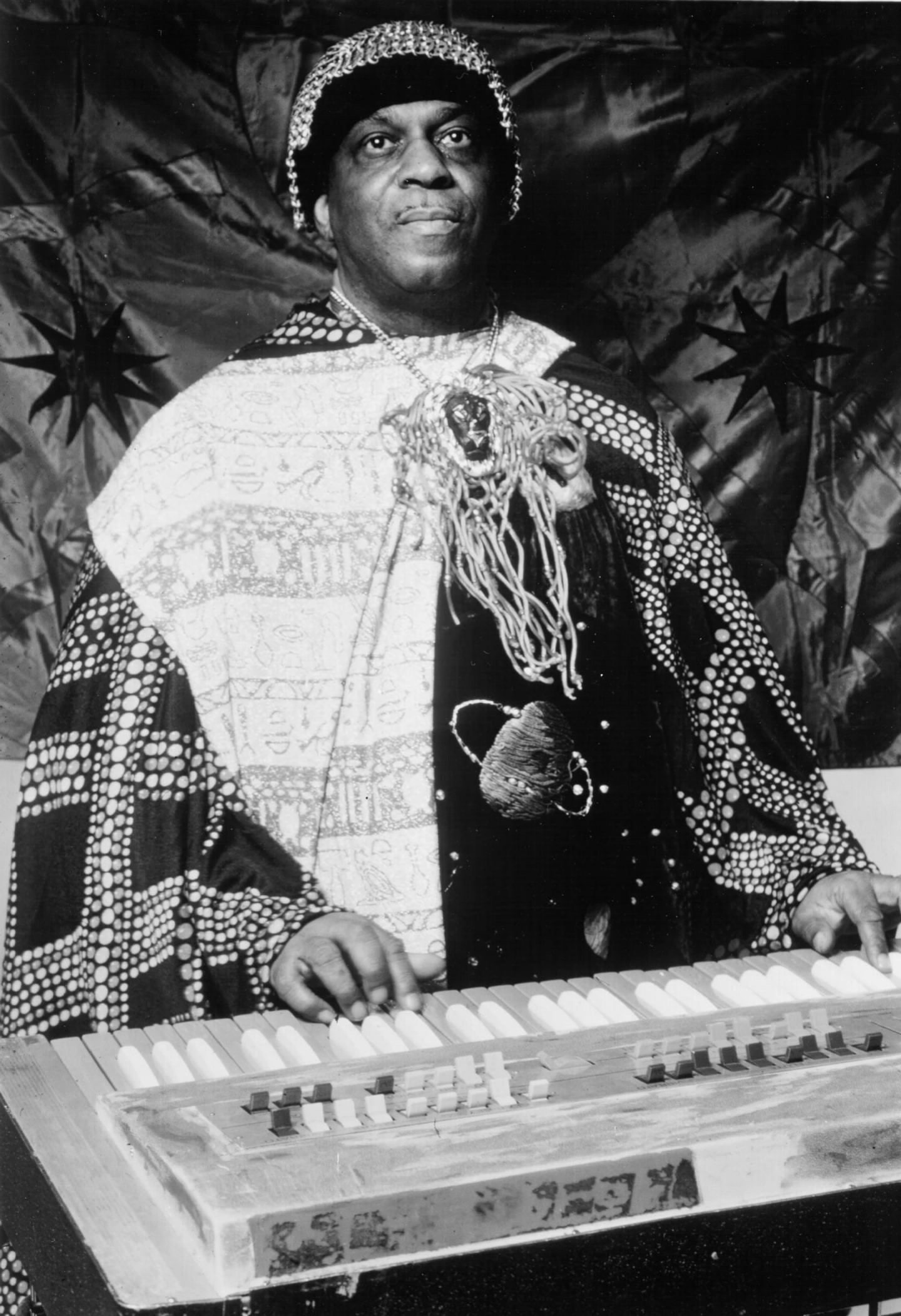 Sun Ra. Photo by Michael Ochs Archives/Getty Images.
Sun Ra. Photo by Michael Ochs Archives/Getty Images.
“Sun Ra said to me, ‘Quit playing what you know. I wanna hear what you don’t know.’ And he said, “I don’t wanna deal with this up here [points to head]. I want here [points to heart], that you don’t know. You have to find that before I let you in this band.’” — Marshall Allen
What was the most rewarding part of interpreting Sun Ra’s music for this record?
Jlin: Being a melanated woman who is constantly trying to learn from as many elders as possible, it’s an absolute honor to have interpreted their work. Sun Ra has wisdom on top of wisdom, and being an intuitive creator, I can feel and hear it in his work.
LARAAJI: Connecting to my own inner sense and love of doo-wop music, and offering my own ambient textural compositional sounds to a Sun Ra music track; finally collaborating with Sun Ra’s music from within my ambient orientation.
RP Boo: As I received the stems and listened to them, I smiled with joy [at] how it is that I missed these amazing sounds and words. It is so much up my alley.
David Harrington of Kronos Quartet: I love the way that everyone who has participated with Kronos in making this album jumped at the opportunity to use Sun Ra’s original sources. I feel we are all a bit bigger for this adventure and we have expanded our frames of reference and taken new steps guided by the muse of Sun Ra.
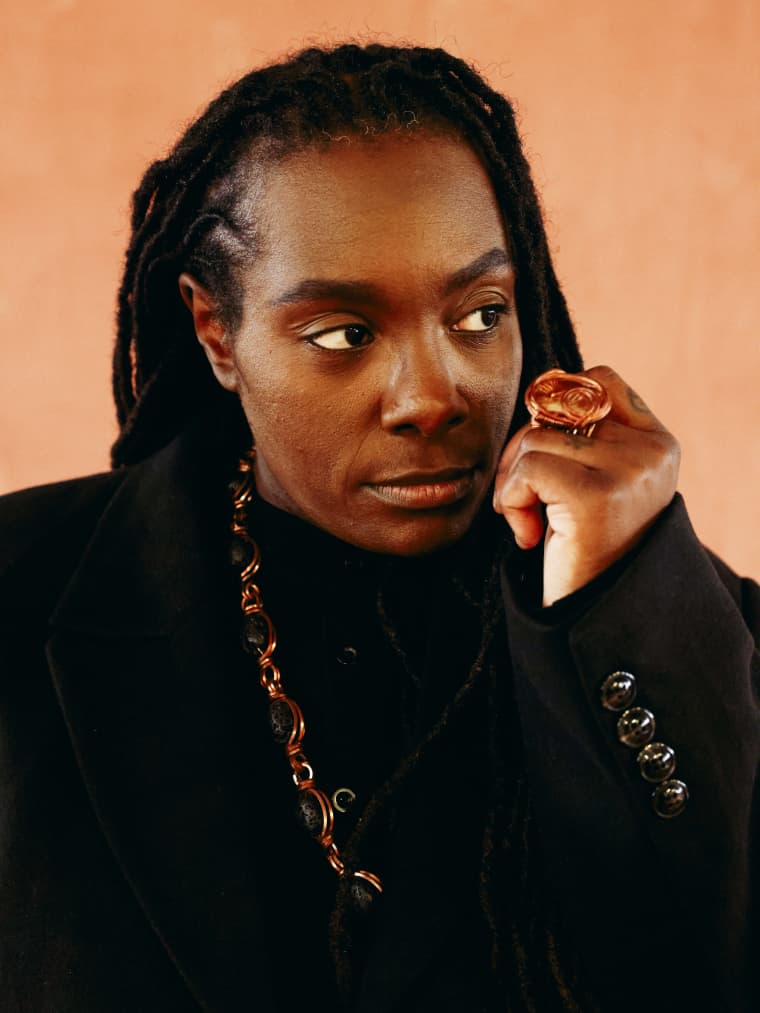 Jlin. Photo by Lawrence Agyei.
Jlin. Photo by Lawrence Agyei.
 Nicole Lizée. Photo by Richmond Lam.
Nicole Lizée. Photo by Richmond Lam.
Steven Bernstein: Part of my love for music is the scientific/pythagorean side. I have been enchanted by Sun Ra’s music from Chicago in the ’50s for so long, and to have the opportunity to use his handwritten score and rediscover the harmonies he was using at that time was an incredible experience. And bringing in the mysteries of Marshall, Laurie, and Kronos satisfied the other side.
Nicole Lizée: Many things: Deep diving into the catalog — this could have gone on for months (there was a danger of it being years) before deciding on the precise samples or direction for my track. I love going down the rabbit hole and often never want it to end. I knew from the start that I wanted to ‘duet’ with Sun Ra, with his vocals, so that was a massive thrill. The process of laying down the vocals, stacking them, harmonizing, adding some rather extensive kazoo lines, and then sending it over to Kronos to add their magic — and then hearing the complete mix — was quite joyous.
“It feels good to work with anybody who does things! ‘Images…’ I like that!” — Marshall Allen
Marshall Allen turned 100 last month. How has his stewardship of Sun Ra’s legacy affected your relationship to it? Are there any other special birthday messages you’d like to send his way?
David Harrington of Kronos Quartet: Marshall Allen proves every day that [to be] a musician is to throw one’s entire life into each next sound. He is a huge force of nature and a big inspiration to every musician who gets to encounter him. I’m so glad he joined us on Kronos and Friends! Thanks to Red Hot, John Carlin, and Elia Einhorn for making this happen!!
LARAAJI: Marshall Allen has given me an extended sense of enjoyment of the Sun Ra sound. I’d like to send a birthday message wishing him continued joyful SONIC channeling, here and beyond.
Jlin: Mr. Allen is an extension of Source having a human experience. I wish him continuous infinite prosperity. What a gift and honor to travel around the Sun 100 times. As far as Sun Ra’s legacy, I do not have the wisdom they have yet, but I do my best creatively with the 37-year experience I do have. Thank you Sun Ra for your continuous contributions to this world.
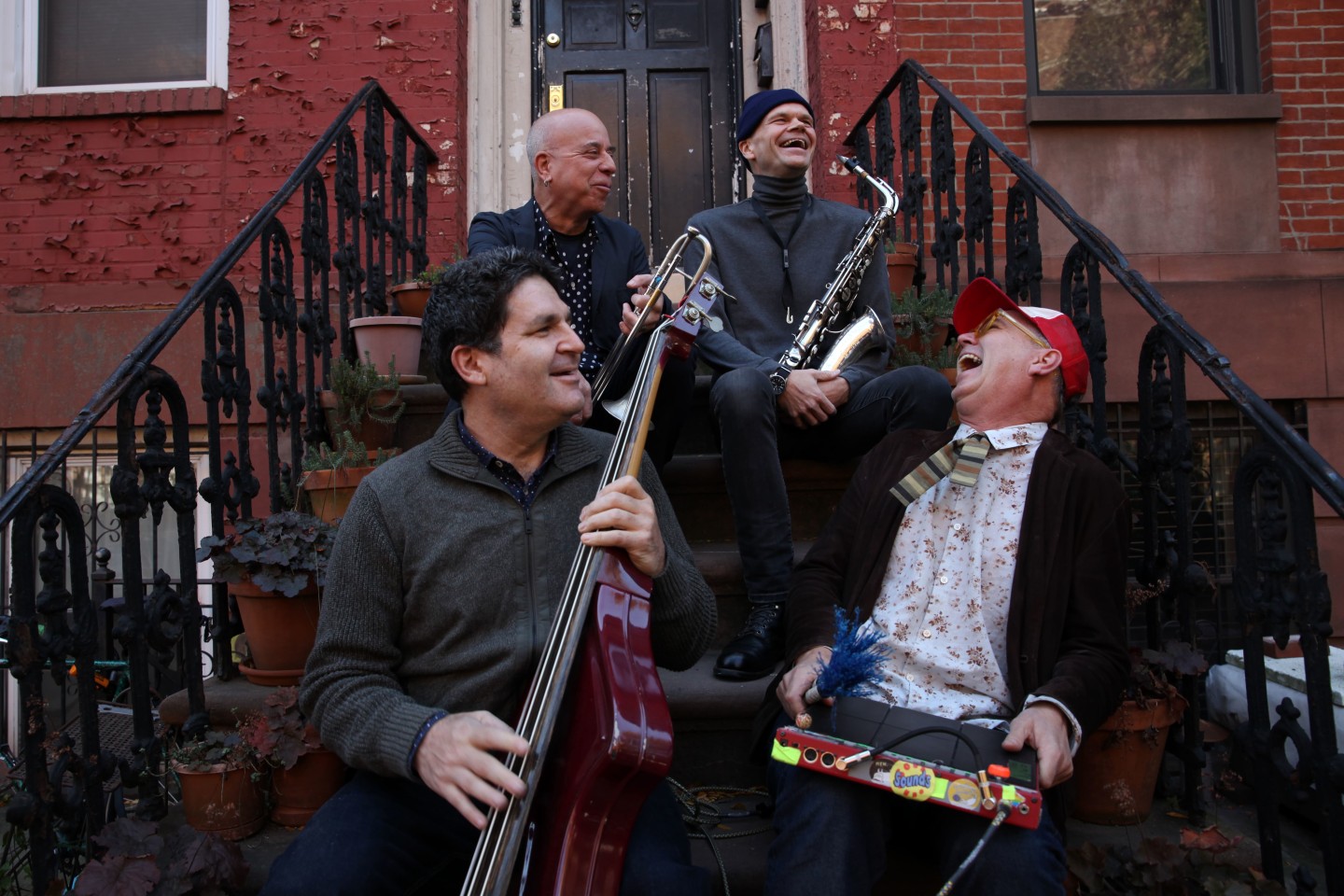 Steven Bernstein’s Sexmob. Photo by Greg Aiello.
Steven Bernstein’s Sexmob. Photo by Greg Aiello.
Steven Bernstein: Around 10 years ago, I did a double bill with the Arkestra at the Brooklyn Bowl. I hadn’t heard the band under Marshall’s direction for a while, and the set was magical. Backstage, I told Marshall that after all my years of study of the science of music, the harmonies he created with the band still present my ears with a sound I can’t identify. (He smiled and said, “I know.”) Happy birthday, and thank you, Marshall Allen, for continuing to open our ears to the possibilities around us.
ELUCID: Marshall Allen has been a good steward of Sun Ra’s philosophy and work so that it’s able to be carried down. That’s really, really cool for someone like Sun Ra, or anyone who just plants their feet in this world and establishes something that people are drawn to. The fact that people are able to pick it up and carry it on after you’re gone, that has to be the highest honor, really. It has to be the highest honor.